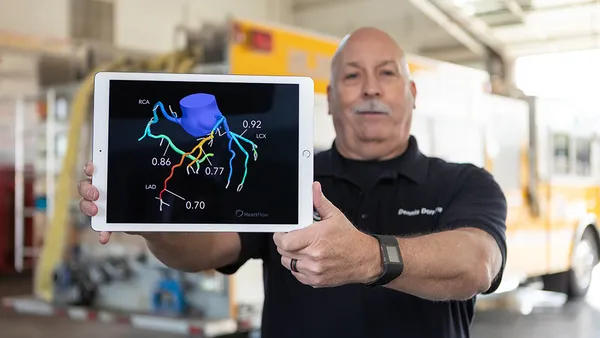Dive Brief:
- TransEnterix, maker of a robotic surgery system that competes with industry pioneer Intuitive Surgical, said Thursday it received FDA clearance for smaller-sized instruments for use in its minimally invasive procedures.
- FDA approved 3- and 5-millimeter instruments for the medical device maker's Senhance system, enabling surgeons to operate through smaller incisions that are expected to be nearly scar-less for the patient.
- The Senhance system, which gained FDA approval one year ago, is indicated for laparoscopic gynecological surgery, colorectal surgery, cholecystectomy and inguinal hernia repair.
Dive Insight:
TransEnterix became David to Intuitive Surgical's Goliath when the startup took on the giant that transformed the field of surgery with its da Vinci robot, introduced in 2000. TransEnterix positions itself as a more affordable alternative for robot-assisted surgery, with reusable instruments and open-platform architecture.
The strategy is starting to gain traction. Earlier this month, TransEnterix announced the sale of four Senhance systems and preliminary revenue of $5.4 million in the third quarter. Last month, the North Carolina-based company said it would acquire the assets of MST Medical Surgery Technologies, developer of software for advanced visualization, scene recognition, artificial intelligence and data analytics.
By winning approval to launch an expanded set of smaller instruments for the endoscopic manipulation of tissue —somethings surgeons have asked for —TransEnterix gains another selling point to distinguish itself from Intuitive.
"Utilizing 3-millimeter micro instruments on a robotic system represents a new advancement in reducing the invasiveness of many surgeries," Steven McCarus, chief of gynecologic surgery at Florida Hospital Celebration Health, said in a press release. "Surgeons may find that using such tiny instruments with the precision and control of a digital interface makes microlaparoscopy a preferred option to treat more conditions."
The robotic surgery market is expected to see an influx of new competitors within the next few years. Medtronic last month announced acquisition of Mazor Robotics, maker of a robotic system for spine surgery, and is working on a robot that would compete more directly with Intuitive’s da Vinci. Other companies with their sights on the market include Johnson & Johnson and Google's Verb Surgical collaboration, Auris Health, Titan Medical, Medrobotics and Accuray.











